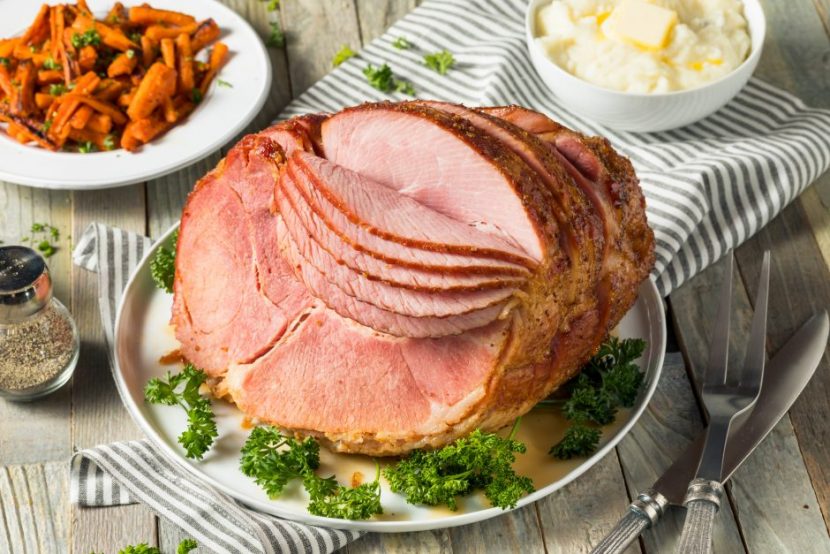We used to think eating “mini-meals” all throughout the day was the best for health. But recent findings show this isn’t necessarily healthy or good for weight loss. In fact, eating less often throughout the day may provide more benefit for some. And that’s why eating patterns like “one meal a day” have become popular.
But is the “one meal a day” diet the best option? Below, I’ll cover what exactly the diet is and what I recommend most for weight loss and health.
What is the One Meal a Day Diet?
One meal a day (OMAD) is a form of intermittent fasting, which is a modified fast where you go a certain amount of time without consuming food or calories.
The most popular form of intermittent fasting is 16/8. With 16/8 fasting, you only eat within an 8-hour window each day, such as from 12pm to 8pm, and “fast” outside that window. In this case, the fasting window is 16 hours.
So with OMAD, you shorten this window (and your daily calories) into just one meal. So your intermittent fasting ratio is about 23/1—eating your one meal within about an hour each day while fasting for the remaining 23 hours.
And in most cases, the OMAD meal is dinner.
Contents of a One Meal a Day Diet
At its core, a OMAD diet can include anything.
However, the best meal is full of nutrient-rich keto-friendly foods like:
- Good fats, including coconut oil, virgin olive oil, nuts and seeds, avocado, MCT powder, and grass-fed beef tallow
- Tons of low-carb vegetables, including spinach, romaine, kale, avocado, and asparagus
- Healthy proteins, including grass-fed beef, pasture-raised poultry, and wild-caught fish
Possible Benefits of Doing One Meal a Day
There are a number of ways OMAD can be beneficial. Let’s look at some of the biggest pros:
Rapid Weight Loss
Many of our Keto Zone members incorporate fasting because it restricts calories easily and can be great for dropping weight quickly. OMAD is a form of fasting, so it may be helpful for some.
Any type of fasting is especially effective when combined with the Keto Zone diet, which is great for rapid weight loss.
Related: Benefits of the Keto Diet and Fasting.
No Extra Thinking About Meals
You’re just eating one meal per day, you aren’t worrying about additional cooking, baking, or snacks throughout the rest of the 24 hours. You take care of your calories in one sitting and let your body fast the rest of the time.
Better Overall Health
Research done on intermittent fasting has found it may help improve many aspects of health, including:
- Possible improvements in body fat and weight composition, triglycerides, and cholesterol in normal weight, overweight, and obese people [1, 2]
- Improvements in blood sugar in type 2 diabetics [3]
- Boosted memory and energy levels
- Improved sleep and eating cycles to enhance overall health, especially in people who are obese [4]
Now, with all this said, there are a number of reasons I don’t recommend OMAD as the best diet. Let’s look at the cons.
Downsides and Precautions of One Meal a Day
OMAD has potential benefits, but it may not be the best for most. For one, it can lead to:
- Feelings of extreme hunger
- Weakness or shakiness
- Trouble concentrating
- Changes in mood, irritability, or fatigue
(Note that some initial side effects of intermittent fasting are also detoxing or keto flu side effects that pass with time.)
OMAD can also be a shock to the system, especially if you’re new to fasting and used to eating more frequently.
What I Recommend Instead of One Meal a Day
While eating one meal per day may work great for some people, and I do see its benefits, overall I think it’s better to do two meals a day (TMAD) instead. The reasons for this include:
- You have more time to eat nutrient-rich keto foods to support your health.
- It’s less restrictive and easier to maintain long-term.
- You don’t stress your system by eating all your day’s calories and nutrients in such a small window.
- You can still benefit from intermittent fasting.
TMAD lets you reap the benefits of fasting in a more realistic and long-term way. For most people, this means fasting through breakfast and eating lunch and dinner within an eight-hour period.
So, if you’re looking to reboot your health with the benefits of fasting, one meal a day may be an option for you. But two meals a day within an eight-hour fasting window is far more realistic and probably best for most people.
Sources:
- https://www.ncbi.nlm.nih.gov/pubmed/26374764
- https://nutritionj.biomedcentral.com/articles/10.1186/1475-2891-10-107
- https://www.wjgnet.com/1948-9358/full/v8/i4/154.htm
- https://www.ncbi.nlm.nih.gov/pubmed/28537332
Check Out More Keto Articles Join Our Keto Group

















Comments are closed.